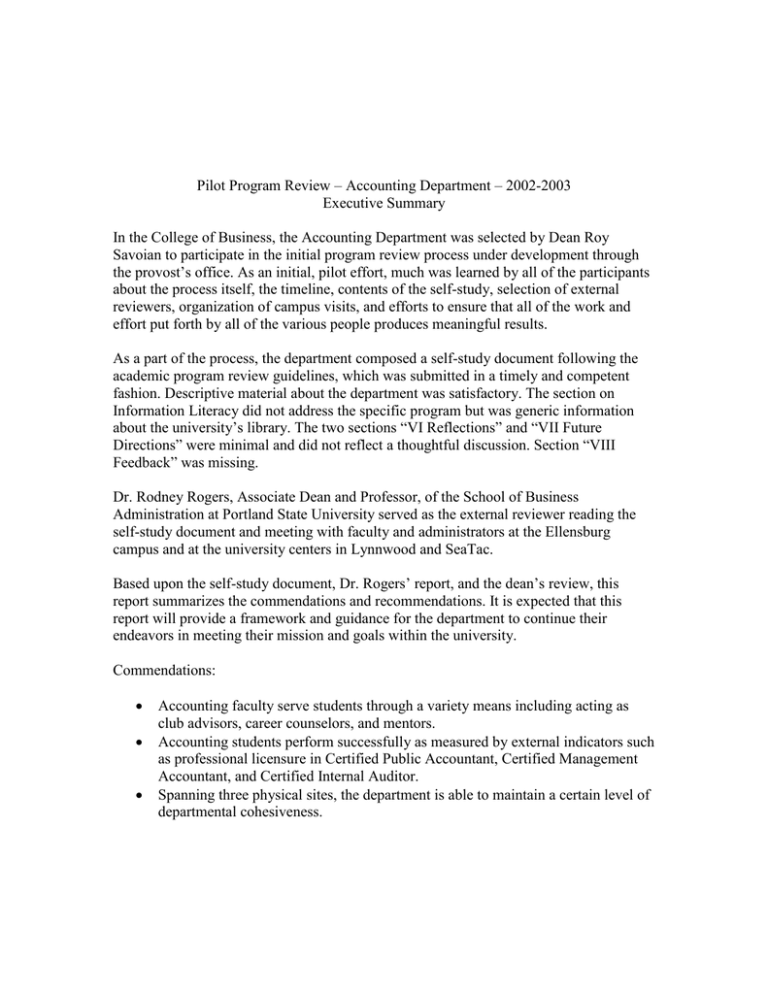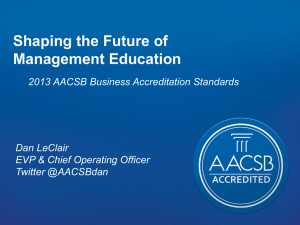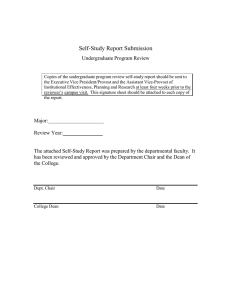Pilot Program Review – Accounting Department – 2002-2003 Executive Summary
advertisement

Pilot Program Review – Accounting Department – 2002-2003 Executive Summary In the College of Business, the Accounting Department was selected by Dean Roy Savoian to participate in the initial program review process under development through the provost’s office. As an initial, pilot effort, much was learned by all of the participants about the process itself, the timeline, contents of the self-study, selection of external reviewers, organization of campus visits, and efforts to ensure that all of the work and effort put forth by all of the various people produces meaningful results. As a part of the process, the department composed a self-study document following the academic program review guidelines, which was submitted in a timely and competent fashion. Descriptive material about the department was satisfactory. The section on Information Literacy did not address the specific program but was generic information about the university’s library. The two sections “VI Reflections” and “VII Future Directions” were minimal and did not reflect a thoughtful discussion. Section “VIII Feedback” was missing. Dr. Rodney Rogers, Associate Dean and Professor, of the School of Business Administration at Portland State University served as the external reviewer reading the self-study document and meeting with faculty and administrators at the Ellensburg campus and at the university centers in Lynnwood and SeaTac. Based upon the self-study document, Dr. Rogers’ report, and the dean’s review, this report summarizes the commendations and recommendations. It is expected that this report will provide a framework and guidance for the department to continue their endeavors in meeting their mission and goals within the university. Commendations: Accounting faculty serve students through a variety means including acting as club advisors, career counselors, and mentors. Accounting students perform successfully as measured by external indicators such as professional licensure in Certified Public Accountant, Certified Management Accountant, and Certified Internal Auditor. Spanning three physical sites, the department is able to maintain a certain level of departmental cohesiveness. Recommendations: There needs to be a more systematic and formal assessment of the graduates within the context of programmatic goals and student learning objectives. Current undergraduate curricular offerings need to be analyzed for inclusion of additional topics. Faculty scholarly activity will need to meet AACSB accreditation standards. The role of the graduate program within the mission of the department and the university should be explored. The first recommendation reflects the concern that while there is anecdotal evidence of the quality of the accounting graduates, there is no organized or systematic manner in which data is gathered that connects the program goals and student learning goals with student performance. As an example, the self-study document states that results of the CPA examination are reviewed annually, but no data were given in the document to illustrate how well CWU students performed. As Dr. Rogers noted, “AACSB requires that school’s articulate and measure key ‘discipline-specific knowledge and skills’ that students have learned in their major. These appear to be two processes that are needed.” The second recommendation addresses the absence of at least two areas of knowledge that accounting undergraduates are expected to have but are not addressed in CWU’s accounting program. These two areas were identified by Dr. Rogers including “every graduate has an understanding of key issues regarding systems as they relation to accounting. This is especially true in light of the increased expectations of the accounting profession as they relate to the Sarbanes-Oxley Act.” Dr. Rogers also notes the CPA examination will be changing format to include evidence of critical thinking and information literacy on the part of the examinee by requiring the candidate to research various accounting problems. How this is going to be addressed in the accounting curriculum is a topic for the faculty to discuss. As Dean Savoian indicated, the faculty will need to follow AACSB accreditation processes including “(1) monitor and evaluate the appropriateness of the curriculum; and (2) articulate and measure key discipline-specific knowledge and skills that students have learned.” The third recommendation reflects the accreditation standard as established by AACSB. Currently, the College of Business is working on this nationally recognized standard which must be included in the university’s program review for the college and its respective departments. Support for meeting this standard is available through the College’s professional development opportunities. The fourth recommendation to scrutinize the masters in professional accountancy program is addressing several issues. In terms of the curriculum of the master’s program, Dr. Rogers notes the lack of consistency between the program goals and the courses students are required to take. For example, Dr. Rogers notes the absence of course work on accounting information systems although the goal is to help students “understand the ethical, legal and economic implications of a technology-mediated global economy.” In addition, the masters program has not met with the success in terms of enrollment as originally anticipated. One reason for this may lie in the fact that students do not necessarily need a master’s degree in order to be successful in their employment. The university is being challenged to serve more students with fewer resources. There are fiscal and enrollment pressures across all academic institutions. What role the masters in professional accountancy should play within the context of fiscal conservancy and AACSB accreditation standards is a discussion that needs careful and thoughtful development. Recommendations for Dean and Provost’s Office: Provide assistance and guidance as faculty discusses the curricular and assessment recommendations. Continue to assist and support faculty efforts in meeting AACSB academic and scholarly standards. Begin planning on meeting personnel needs as faculty retire. Overall, the accounting department is at a stage where some significant thought and effort will assist them in creating stronger departmental programs built upon clearly defined student learning statements, programmatic assessment and the optimum mixture of faculty life of teaching, scholarly endeavors and service.

